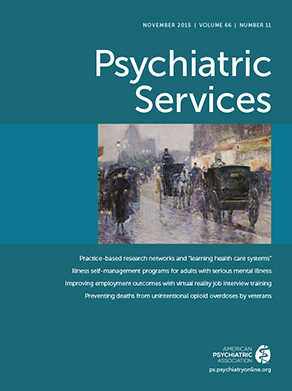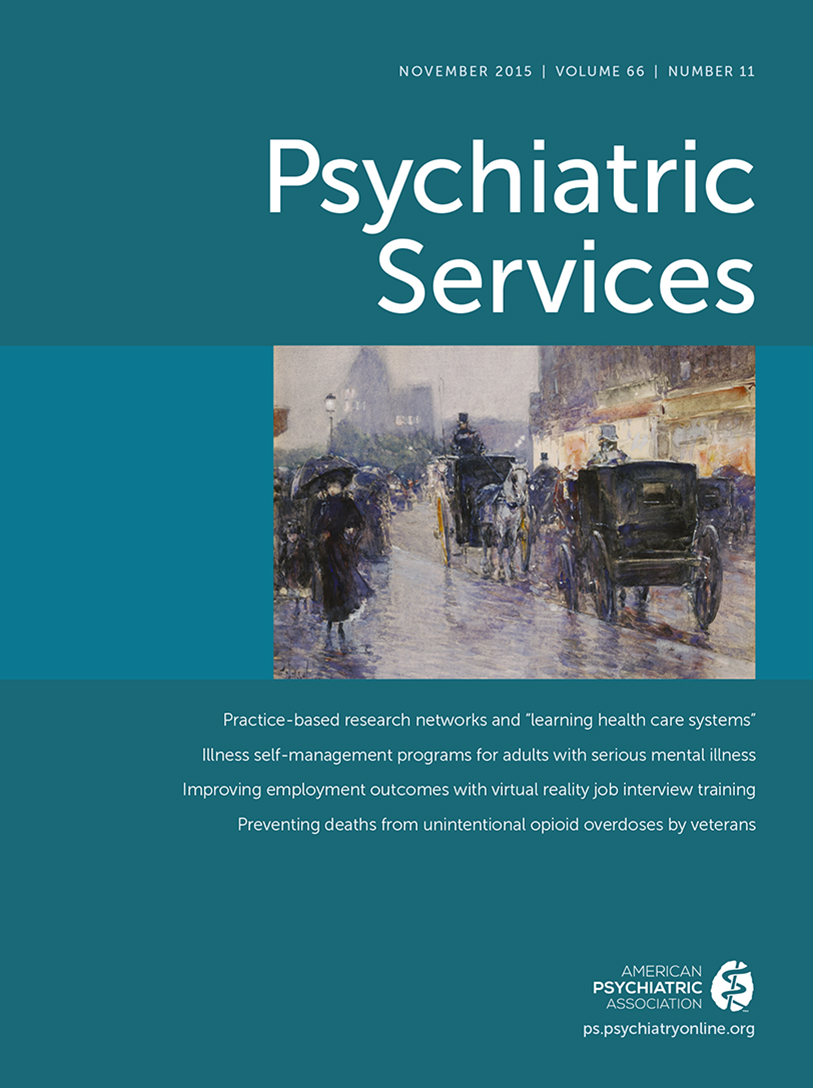Young adults with severe mental illness must deal not only with their mental disability but also with their transition to the “adult world,” including adult psychiatric services. Adulthood requires greater emotional, social, and financial independence. Because this developmental period is a unique time of both vulnerability and opportunity, the rehabilitation of this population poses a challenge for psychiatric services (
1). To meet this challenge and provide a transitional phase between adolescence and adulthood, in 2009 the Israeli government launched two pilot programs as part of a psychiatric rehabilitation “basket of services.” These services were implemented in the course of government-sponsored mental health care reform (enacted into law in 2000), which has shifted the locus of services from psychiatric institutions to the community (
2).
To promote independent functioning, both programs employed a community-based Illness Management and Recovery approach (
3), which was delivered through individual and group support and supported employment. The supportive model program (SMP) emphasized gradualism, support, and containment, whereas the demanding model program (DMP) emphasized a more immediate, practical approach. The SMP provided routine personal and therapeutic support and allowed gradual exposure to the adult world by teaching relevant coping skills and providing one day per week of supported employment. The DMP provided personal and therapeutic support only when the need arose and encouraged immediate independent functioning through direct contact with nonsupportive social and employment frameworks, including five days per week of employment.
Table 1 shows the main differences between the programs. [A table with additional details is available in an
online supplement to this column.] Between July 2009 and March 2011, a formative and developmental evaluation study of both programs was conducted (
4), the main results of which are presented here.
Study Sample, Design, and Data Collection
Participants, who were between the ages of 18 and 30, had been hospitalized for severe mental illness at least once during adolescence. [A table in the online supplement presents additional demographic data.] They lived with their parents and freely chose which program to join and when to join it. Graduation was determined individually according to progress assessments by the participant and staff.
To improve program implementation, qualitative and quantitative assessments were conducted every five months between July 2009 and March 2011, and data were fed back to the programs' staff as part of a formative and developmental evaluation (
4). [More information about procedures is available in the
online supplement.] After signing an informed consent form, participants (SMP, N=53; DMP, N=29) completed semistructured questionnaires that were administered in person; they used Likert scales to assess self-perceived mental well-being, work performance, and the contribution of various program components to rehabilitation. Open-ended questions were completed in the form of one-on-one interviews, and qualitative data were content analyzed to identify special program characteristics. Closed-ended questions were analyzed with a two-way repeated-measures analysis of variance, with program (SMP or DMP) and time (first and last measurement) as the independent variables. Because participants joined and left the programs at different times during the study, two assessments were not available for all participants. Thus quantitative analyses were based on assessments of 29 SMP participants (55%) and 19 (66%) DMP participants. Follow-up data, obtained through telephone interviews with graduates and their parents during February 2012, were available for 41 (77%) SMP graduates and 16 (55%) DMP graduates with whom contact could be established.
Main Findings
Interviews indicated that the DMP was perceived as more “intimidating” than the SMP, which may explain the different program recruitment rates. Dropout rates were significantly lower in the SMP than in the DMP (4% versus 21%), and interviews indicated that the difference resulted from the more gradual integration of SMP participants and the close support of SMP staff. One DMP participant (4%) and 13 SMP participants (25%) were hospitalized during the study period; the DMP participant dropped out after the hospitalization, but all SMP participants returned to the program. SMP participants explained that they returned because of the close contact with the staff members throughout the hospitalization.
Quantitative analyses indicated that learning in group meetings, social activities, and working experience significantly contributed to self-perceived rehabilitation in both programs. Participants in both programs also demonstrated a significant improvement in self-perceived confidence and hope, an aspect of well-being that the rehabilitation and recovery approach considers crucial. SMP participants reported a significant improvement in the parameter “not being dominated by symptoms of the illness,” indicating improvement in their illness management capabilities.
A declared goal of the initiators, staff, and participants of both programs was improving work performance, which promotes financial independence and social inclusion (
5). The most striking improvement was among SMP participants, who initially reported a relatively low level of work performance but showed a dramatic improvement at the last measurement. DMP participants reported a relatively high level of work performance at the first measurement. Of note, they maintained this high level throughout the program and during the intensive working experience, and they rated the contribution of the working experience to the rehabilitation process higher than SMP participants did. [Tables in the
online supplement present data from these analyses.]
Qualitative analyses revealed that “belonging to a group” greatly improved personal well-being and happiness in both groups. DMP participants, who had more active social lives, generally reported that group activities contributed considerably to the pleasant group climate, increased social functioning, strengthened peer support, and enhanced the perception that fellow group members are a resource of support. SMP participants often reported that individual meetings with staff members were key to their improvement. However, they found learning groups and coping-skills lessons to be exhausting and preferred more enjoyable activities (for example, dancing, cooking together, meeting friends, and attending excursions and parties).
Follow-Up
At follow-up ten to 11 months after graduation, 41 (77%) SMP graduates and 16 (55%) DMP graduates were interviewed. Fifteen (94%) of the interviewed DMP graduates reported that they lived, worked, or studied in nonsupportive frameworks. Only eight (20%) of the interviewed SMP graduates reported integration within such frameworks, and 12 (29%) reported integration within supportive frameworks [see table in online supplement]. Parents of graduates in both groups stressed the contribution of the program to different aspects of their child’s life, and 20% of the SMP parents (N=8) reported an emotional letdown for their child after the program concluded. Among DMP parents, 25% (N=4) noted that they would have preferred closer contact with the staff during the program. Follow-up data, however, should be interpreted with caution because of methodological issues described below.
Effects of the Developmental Evaluation
As a result of the evaluation feedback, some SMP components were implemented in the DMP and vice versa (
Table 1). In the DMP, a psychologist was added to the staff to enable accessible and routine consultation, and a transition phase was introduced to allow new participants to continue living with their parents and to attend only social and vocational activities during the initial stages after program entry. These changes were associated with considerably decreased dropout rates in the second program year [see table in
online supplement]. The SMP staff began to emphasize that participants shared responsibilities for operating and marketing the program in order to highlight personal assets and increase social and personal involvement, equality, and partnership. After this change, SMP participants began perceiving their peers as a significant source of support, and interpersonal relationships were greatly enhanced (including the formation of some romantic relationships between participants). In addition, two continuation components were included in the SMP: an afternoon social club for participants and graduates and an employment club operated by an employment coordinator who accompanied graduates during job searching and on job interviews and taught them relevant employment-related skills.
Implications for Best Practice
Participants in both programs reported an improvement in independent social and vocational functioning and in personal confidence and hope. Such positive changes reflect greater capacity to adapt and respond to the challenges of adulthood in the domains of employment, academic studies, social relations, and housing (
1,
6). We speculate that the improvement can be attributed to the following components, many of which are known to promote independence among young adults with severe mental illness: a patient-centered Illness Management and Recovery approach that encouraged self-expression and active participation; individually adjusted personal and vocational plans constructed with each participant; involvement of participants in leading group and social activities that promoted mutual feedback and enhanced participants’ sense of belonging and peer support and feeling of being valued; the open-market employment experience, which may have better prepared participants to function in normative adult employment frameworks; and the continuation component that may have mitigated the challenging transition to normative, nonsupportive frameworks.
A larger proportion of DMP graduates transitioned to nonsupportive frameworks, and some SMP graduates experienced an emotional letdown after program conclusion. These findings imply that a more demanding approach, when monitored closely by professional staff and manifested in later stages of the process, may prepare participants for the adult world. This issue should be more thoroughly investigated.
Limitations
Evaluation of programs that are not yet fully established is an important “optimization tool,” but it is also challenging methodologically. The pilot nature of the programs resulted in a small number of initial recruits. In addition, the number of participants available for assessments at two time points was further reduced because participants joined and graduated at different times. Second, although recruitment criteria were identical for both programs, self-selection may have contributed to important baseline differences between the groups. Finally, because many participants could not be contacted for follow-up, the data were limited, imbalanced, and probably biased by self-selection.
Conclusions
Combining supportive and demanding components at different stages of the rehabilitation process may constitute a best practice for young adults with severe mental illness. Supportive components (for example, gradual integration and routine meetings with a therapist) may increase recruitment rates, decrease dropout rates, and promote overall satisfaction and well-being, whereas demanding components (for example, independent housing, intensive and long-term supportive employment, and active involvement in program operation) may provide experiences that are closer to those of young adults in normative adult frameworks.
Acknowledgments
The authors are grateful to the head of the fund, Sarit Baitch-Moray, M.A., and to Carmela Koresh Eblagon, M.A., who chaired the steering committee for the evaluation study.

